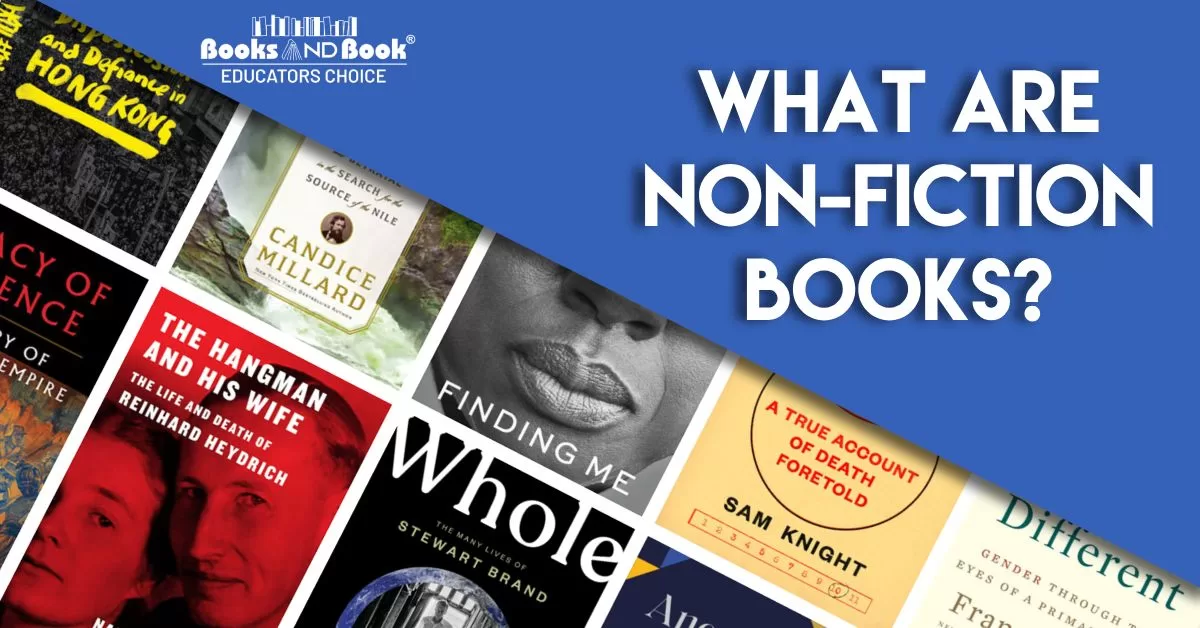When exploring books that can provide insights and knowledge about real-world subjects, non-fiction is the ideal genre to read. But what are non-fiction books and why are they so useful?
Put simply, non-fiction books aim to inform, educate, instruct, or present factual information to readers regarding genuine people, places, events, and ideas through journalistic, academic, or technical writing.
Unlike fiction works that feature imaginary stories and invented characters, non-fiction offers commentary and perspectives on real topics to enlighten readers.
This article will delve into the distinguishing characteristics of non-fiction books, the benefits of reading non-fiction, popular examples across fields, and tips for finding top non-fiction aligned with your interests.
Let’s closely examine the expansive world of insightful non-fiction reading.
What Are Non-Fiction Books: Characteristics
Non-fiction books are defined by key attributes that set them apart from fictional stories:
- They present factual information and convey real subject matter.
- Genuine people, historical events, places, concepts, and discoveries are explored.
- Credible sources like news reports, statistics, and documents can substantiate claims.
- The author assumes an informative role rather than a storytelling role.
- The purpose is to educate, argue, document, or inform on factual topics.
Non-fiction encompasses diverse types of non-fiction literature including biographies, memoirs, essays, self-help guides, travel writing, and specialized informational books covering countless real-world subjects. But the core thread is the honest examination of genuine facts, people, events, ideas, or things. This reliance on accuracy and evidence distinguishes non-fiction writing.
Benefits of Reading Non-Fiction
There are many valuable advantages to reading non-fiction books:
Gain Knowledge on Real-World Topics
Non-fiction allows readers to gain factual information and expand their perspectives on real-world topics ranging from history to science, business, self-help, current events, and more. The knowledge acquired through non-fiction reading enlightens readers on genuine subjects.
Build Critical Thinking Abilities
Non-fiction fosters critical thinking skills by making persuasive arguments backed by evidence. Evaluating the claims, sources, and logic in non-fiction works exercises readers’ analytical faculties. This strengthens their ability to think critically.
Obtain Practical Skills and Advice
The skills, advice, and how-to knowledge presented in many non-fiction works are directly relevant and applicable to readers’ lives. Practical books on topics like personal finance, cooking, parenting, and more impart useful wisdom.
Provide Context to Understand News/Events
By building background knowledge on current issues, historical contexts, sociopolitical factors, and more, non-fiction enables readers to better understand the world. This contextual foundation helps make sense of news and current events.
Gain Insights into Specific Fields
Readers obtain valuable insights into disciplines like science, history, business, anthropology, and more by reading books written by subject experts. Non-fiction provides specialized knowledge.
Find Inspiration Through True Stories
Compelling memoirs, biographies, and historical non-fiction spotlight inspiring journeys, insights, and perspectives from real people. This can motivate and uplift readers.
The factual insights derived from immersing in well-researched and compelling non-fiction works make this genre a vital source of knowledge for self-improvement.
Popular Non-Fiction Books Across Genres
Many influential examples of non-fiction works exist across diverse genres. Here is a sampling of popular non-fiction books and what makes them compelling reads:
History – “A People’s History of the United States” by Howard Zinn provides a groundbreaking revisionist history analyzing overlooked perspectives including native Americans, the working class, and minorities. Offers unique insights.
Science – “A Brief History of Time” by Stephen Hawking makes advanced physics and cosmology accessible and fascinating for lay readers. Demystifies complex concepts.
Business – “The 7 Habits of Highly Effective People” by Stephen R. Covey presents a holistic framework for personal effectiveness based on principles of growth. Offers practical wisdom.
Memoir – “I Know Why the Caged Bird Sings” by Maya Angelou recounts the author’s childhood marked by trauma yet ultimately her empowering rise. Relatable and inspirational.
True Crime – “In Cold Blood” by Truman Capote pioneered the non-fiction novel genre, documenting a shocking quadruple murder case in a literary yet fact-based style. Gripping writing.
Cookbook – “How to Cook Everything” by Mark Bittman skillfully teaches home cooks professional techniques for preparing diverse dishes. Offers recipes and guidance for all skill levels.
These popular non-fiction book examples demonstrate how educational, compelling, and insightful the non-fiction genre can be.
Also read, What Are the 7 Habits of a Good Reader?
Finding the Right Non-Fiction Book for You
Here are some tips for discovering captivating non-fiction tailored to your interests:
- Peruse bestseller lists for the most acclaimed non-fiction works on diverse topics.
- Check Goodreads and other online reader communities for user reviews and recommendations.
- Join a non-fiction book club to uncover new perspectives.
- Scan bibliographies and sources in books you love to find related non-fiction connections.
- Review university course reading lists to identify respected non-fiction works.
- Explore non-fiction genres outside your usual niches to uncover fascinating new areas.
Let your genuine passions and interests guide your non-fiction reading journey toward ever-expanding knowledge and growth. The importance of non-fiction reading is immense.
Exploring Non-Fiction Subgenres
Within broader non-fiction genres exist niche subgenres with specific characteristics. Here is a closer look at some common non-fiction subgenres and notable books:
Biography Subgenres:
Autobiography – Written by the subject recounting their own life story. Characterized by intimacy and personal perspective. Notable example: “The Diary of a Young Girl” by Anne Frank.
Authorized Biography – Biography written with the subject’s consent and involvement. Gains an inner perspective but can lack objectivity. Notable example: “Steve Jobs” by Walter Isaacson.
Memoir – Focuses on a particular period or aspect of the subject’s life. Tends to be more selective rather than comprehensive. Notable example: “I Know Why the Caged Bird Sings” by Maya Angelou.
History Subgenres:
Popular History – Accessible, mainstream historical accounts aimed at general readers. Characterized by engaging storytelling. Notable example: “A People’s History of the United States” by Howard Zinn.
Narrative History – Uses immersive storytelling techniques to vividly recreate historical events and eras. Brings the past to life. Notable example: “In the Heart of the Sea” by Nathaniel Philbrick.
Oral History – Based on interviews with everyday people recounting firsthand experiences. Offers unique personalized perspectives. Notable example: “The Good War” by Studs Terkel.
Conclusion:
After exploring the world of non-fiction literature throughout this article, we can return to our original question – what are non-fiction books?
In summary, they are factual books that aim to inform, persuade, instruct, or document real people, events, ideas, and discoveries through journalistic, academic, or technical writing styles.
As we covered, the truthful essence of non-fiction distinguishes it from imaginative fiction, but it still utilizes the creative presentation of facts. For readers who have not deeply delved into exploring non-fiction topics before, seeking out esteemed works aligned with your interests is an enlightening journey.
High-quality non-fiction has immense power to shift perspectives, build critical analysis abilities, and enable nuanced public discourse on almost any authentic subject under the sun.
FAQ’s
What distinguishes non-fiction books from fiction?
Non-fiction books present factual information, real events, and are based on real people’s experiences, while fiction involves imaginary elements.
How can I identify a non-fiction book in a bookstore?
Look for genres like history, biography, science, or self-help; these are common categories for non-fiction works.
Why should I read non-fiction books?
Reading non-fiction expands your knowledge, provides insights into real-world issues, and can be a valuable source of information and inspiration.
Can non-fiction books be entertaining as well as informative?
Absolutely, many non-fiction books are written in a narrative style, making them both informative and engaging for readers.
Are autobiographies considered non-fiction?
Yes, autobiographies fall under the non-fiction category as they narrate the real-life experiences of the author.


